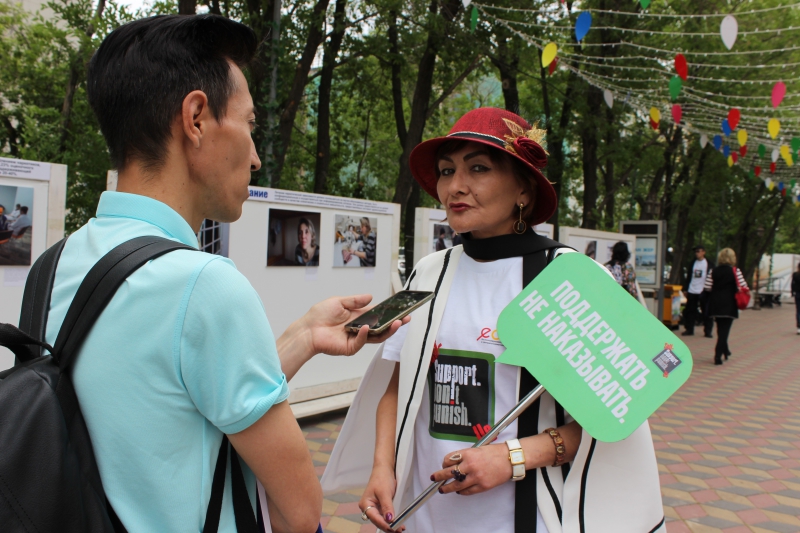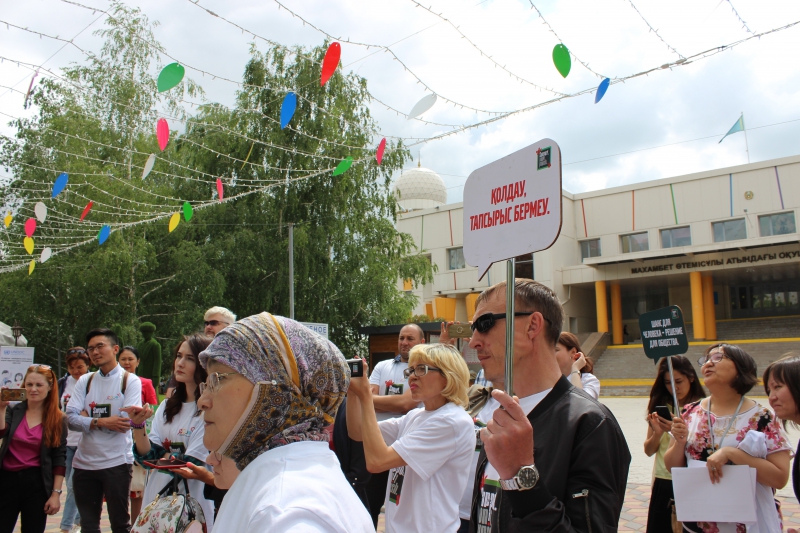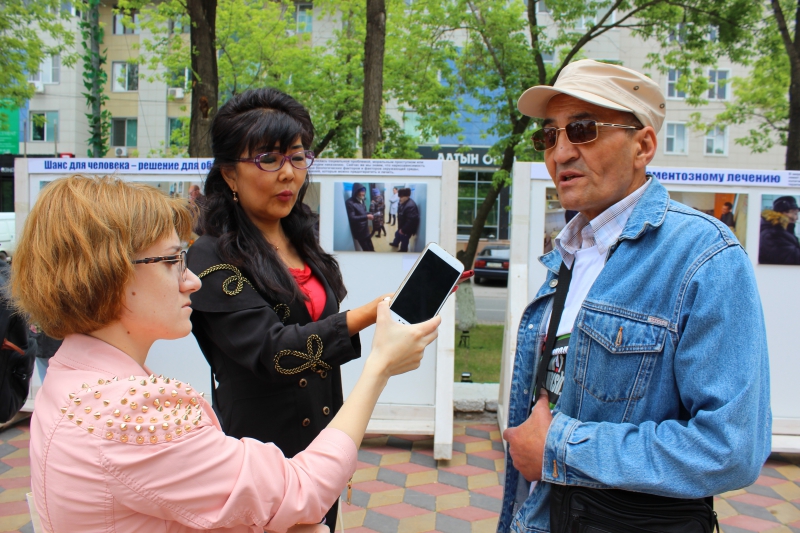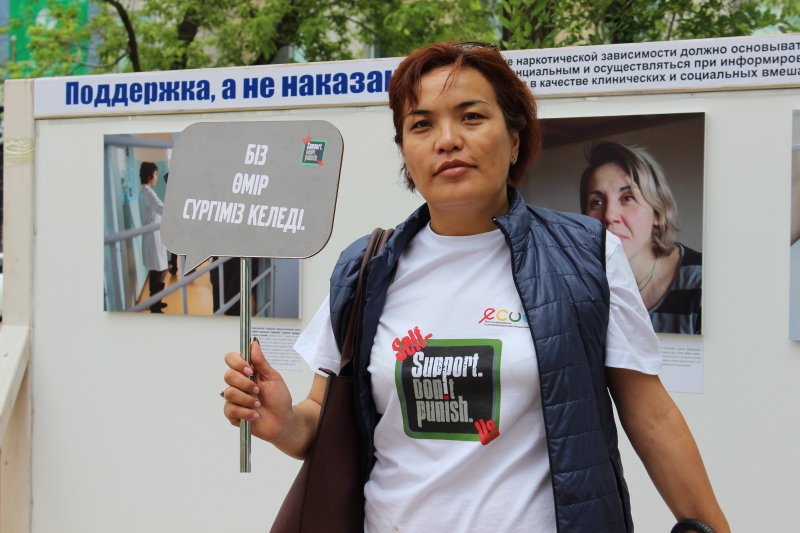The Mentor programme for women in Kazakhstan was established to empower women living with or affected by HIV by connecting them with mentors who share their life experiences and provide critical support during challenging times. Co-financed by the Ministry of Foreign Affairs of the Republic of Kazakhstan and supported by UNAIDS, the program creates a safe space for women to learn, grow, and draw strength from one another. Through training seminars, support groups, and one-on-one mentoring, it helps women overcome stigma, rebuild their lives, and find their purpose.
Meet three inspiring leaders from this programme—women who never saw themselves as heroes but are, indeed, changing lives.
Halima
Several years ago, Halima found herself at a crisis center for women victims of domestic violence in Almaty, Kazakhstan. She was at rock bottom—diagnosed with HIV, grieving the loss of her second son, and trapped in an abusive marriage with a husband who drank heavily and often turned violent. Raised in a family that valued tradition, Halima felt compelled to keep the peace at all costs, but the weight of her daily life became unbearable.
At her lowest point, an elderly doctor’s advice pushed her into action: “If you want your eldest son to end up in an orphanage, your husband homeless, and you in a mental hospital, you are sadly following that path.” Determined to change her fate, Halima sought help at the crisis center, which she credits with helping her climb out of the “dark hole” of depression.
Today, Halima is helping other women in the mentoring programme. She shares her story with women, believing that her experiences can inspire others to seek life-saving HIV treatment and persevere.
At her lowest point, an elderly doctor’s advice pushed her into action: “If you want your eldest son to end up in an orphanage, your husband homeless, and you in a mental hospital, you are sadly following that path.” Determined to change her fate, Halima sought help at the crisis center, which she credits with helping her climb out of the “dark hole” of depression.
Today, Halima is helping other women in the mentoring programme. She shares her story with women, believing that her experiences can inspire others to seek life-saving HIV treatment and persevere.
"I make sure to give each person my undivided attention so I can explain in simple terms what HIV is, what an undetectable viral load means, and how to get better,” she says.
Her work extends beyond Almaty, reaching women in rural areas where information about HIV and access to services is limited. “I have no special education, but I love learning. While I’m cleaning or mopping the floors, I listen to psychologists and doctors on my headphones,” she says, knowing that every bit of knowledge helps her make a difference.
Lena
“This is a complex group,” says Lena from Pavlodar, Kazakhstan. She works with 17 women in a mentoring programme. Many of the women use drugs, have experienced domestic violence or have been in prison. Lena, aged 55, used drugs for over 20 years, but she has been drug-free for seven years, crediting opioid agonist maintenance therapy for helping her quit.
“I went through all this myself. I remember how it was using drugs: I fell asleep—it’s winter. Woke up—summer,” she says. “If a person comes to therapy out of desperation, does not want to steal or torment their parents and loved ones, this programme can help them.”
The therapy helps mitigate the need for drugs, but Lena emphasizes “it is important that peers and psychologists work with people and prepare them to leave the programme and have access to essential HIV prevention services and treatment”.
After being released from prison nearly a year ago, Lena became a peer consultant in the women’s mentoring programme.
“The problem for many people who use drugs is that they live with HIV and TB but cannot access available services or receive therapy,” Lena explains. Without a home or family, they are invisible to the social protection system and are often driven into desperate situations. “They need a helping hand. They are humans and live next to us."
Lena helps some people register for medical or social support facilities, and others to get treatment. She plans to meet with the akim (mayor) to propose a project to create a support system for people who are left behind. Lena believes there should be no situations where a person is alone and cannot be admitted to a home for disabled or elderly people because they are living with HIV. It is crucial to revise the laws so that everyone is allowed access to social institutions.
Lena is dedicated to the programme. “I am reborn from this work. My eyes light up, and I feel strong and ready to help,” she says.
Zulfiya
Zulfiya, a mother of three who has lived with HIV for nearly 20 years, uses her experience to support adolescents and young women in the program. “My task is to help them accept their diagnosis, start treatment, and stick to their medication,” she explains. She refers women to psychologists, social workers, or lawyers when additional support is needed. Zulfiya understands the denial many women face; she felt it herself two decades ago. Inspired by her son, an activist in the Teenager youth organization for adolescents living with HIV, she found her calling in guiding women who never thought HIV would touch their lives.
Connecting women with other women in a predominantly male-dominated society is the foundation of the mentoring program. “Women in Kazakhstan are often forced to solve a wide range of problems themselves, whether it’s financial difficulties, lack of help, or protection from violence,” says Elena Rastokina, coordinator of the Mentor Programme for Women. “They are not used to uniting in women’s communities, do not know how to ask for help, and often do not know their rights.” Despite the challenges, she is immensely proud of what the mentors have achieved. “When women support each other, they find strength they never knew they had. We need each other, and together, we can change lives.”
The mentoring programme covers 10 regions of the country. Dozens of women have received help. Some have learnt a new skill and found a job, and others have managed to accept their diagnosis and restore family ties. With help from the programme, many women who use drugs have managed to quit active drug use, improve adherence to life-saving HIV and TB treatment, and reconnect with the community.
For Aliya Bokazhanova, UNAIDS Country Director a.i. in Kazakhstan, these are incremental steps to empowering women from key populations. “Women living with HIV have the opportunity to develop and receive the necessary support and inspiration from experienced mentors, which contributes to their self-realization and integration into society,” she says.
As of 2024, there are an estimated 40 000 [35 000–46 000] people living with HIV in Kazakhstan. New HIV infections are mostly among people from key populations (people who use drugs, gay men and other men who have sex with men, sex workers, and people in prisons and other closed settings). HIV prevalence among people who inject drugs is almost 7%, compared with 0.3% in the general population.






